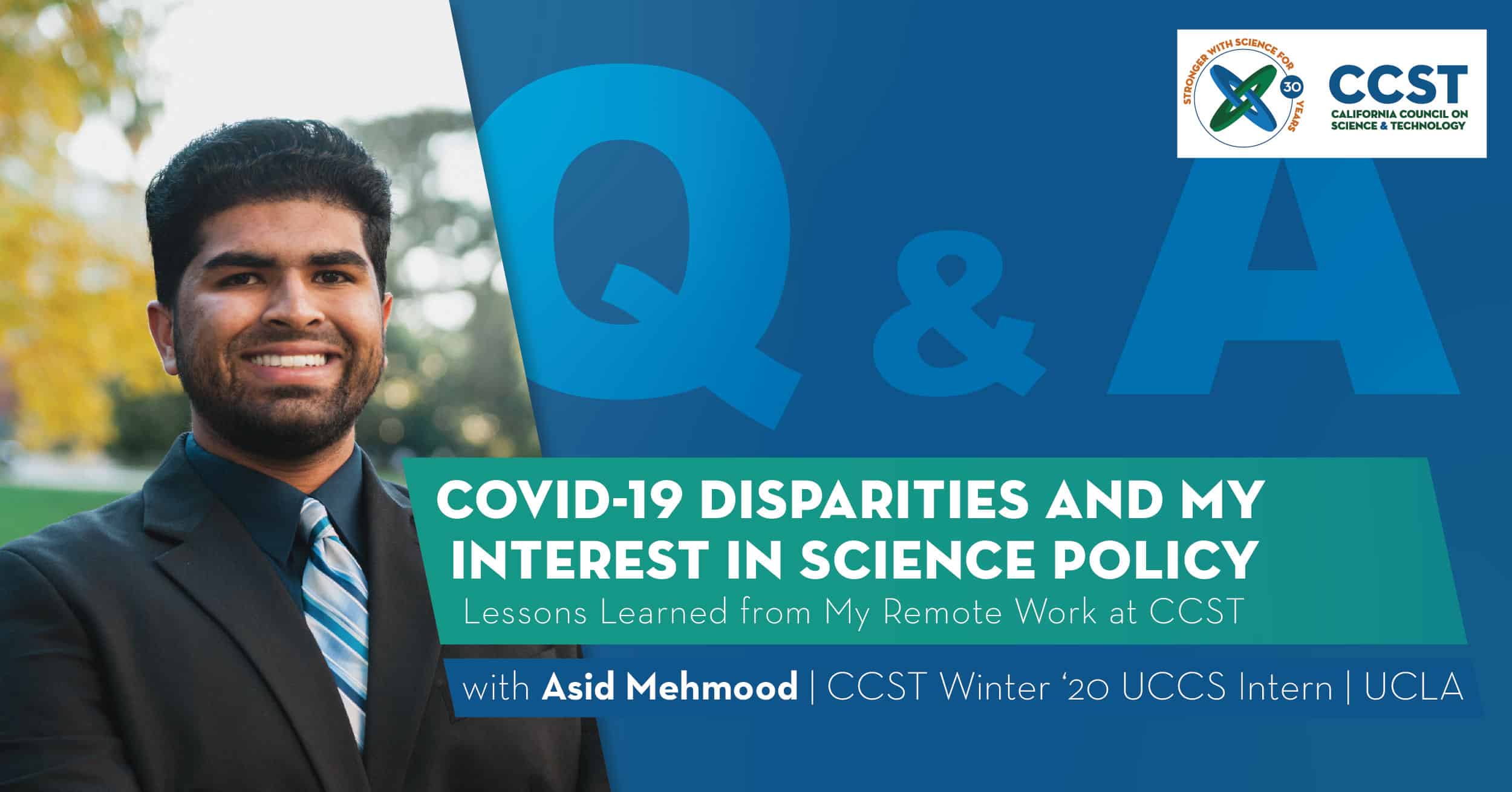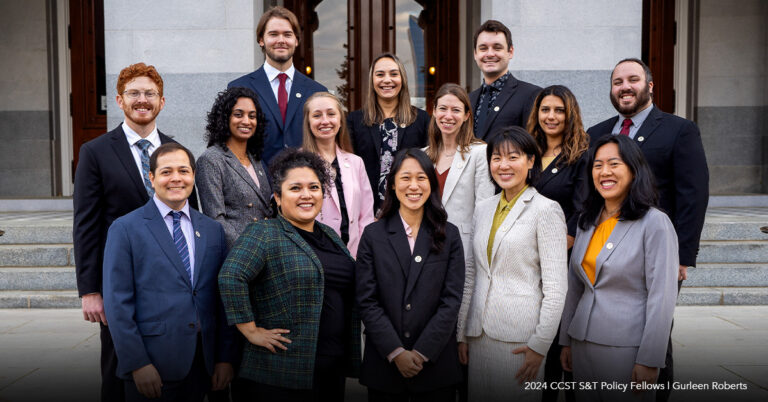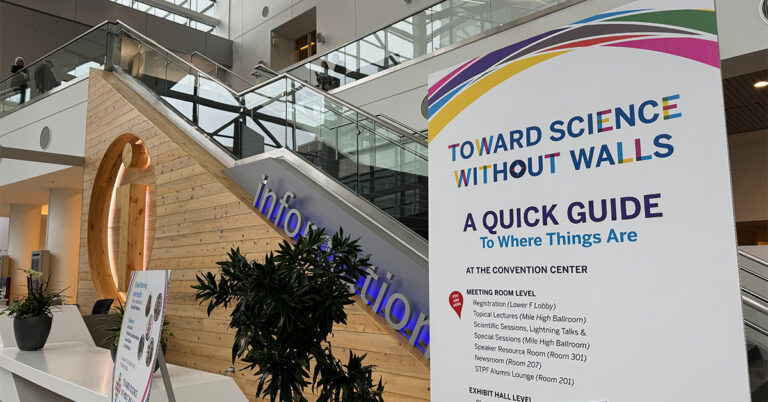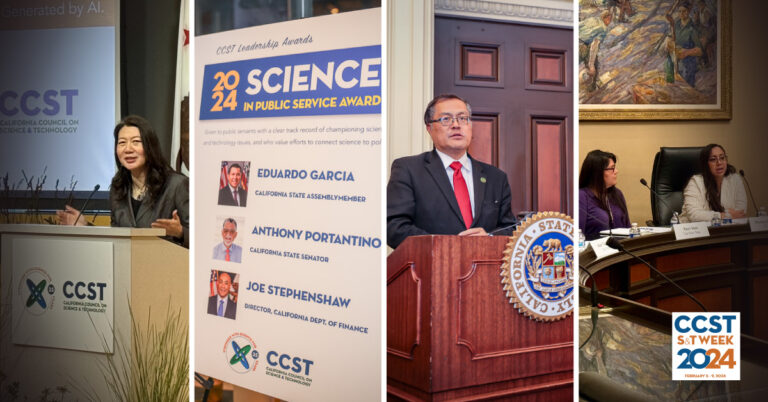Update: Applications for the CCST Science & Technology Policy Fellowship Have Closed
Q&A: COVID-19 Disparities and My Interest in Science Policy
December 15, 2020 | CCST Newsroom
Asid Mehmood is the Fall 2020 intern for the CCST team. He is a visiting student from UCLA and is currently enrolled in the University of California Center for Sacramento (UCCS) program. Asid is an undergraduate student in UCLA’s Ecology and Evolutionary Biology (EEB) program. He is currently majoring in Human Biology and Society and is interested in how individuals can come together to create global change as a collective effort, which led him to pursue a minor in Global Health.
What is the focus of your UCCS research project?
I’m looking at the relationship between California counties’ racial/ethnic compositions and COVID-19 infection and death rates, while controlling for education and poverty. I am trying to understand if these disparities are exacerbated by the COVID-19 pandemic and to what degree the pandemic is disproportionately impacting disadvantaged individuals/communities.
What brought you to the UCCS program and CCST?
The UCCS program was a perfect fit for my interests in the public policy and governance sector. The program provided me with the opportunity to be paired with CCST, where I have honed new skills and gained firsthand experience in using science to inform policy. CCST especially sparked my interest because it offered an opportunity for me to apply my science background to a public policy and governance setting.
What are some takeaways from your work at CCST?
I learned a lot during my time at CCST, but there were two key takeaways from my work:
• Excellent communication and teamwork skills are essential in a public policy and governance environment—especially during remote work.
• It’s important to be open and able to learn new things, in order to be multifaceted and aid in various efforts to achieve team goals.
The team at CCST has provided me the opportunity to develop these skills and see the value of being well-rounded in several areas of expertise.
Actively engage in meetings, briefings, and conversations with the team. Collaborative teamwork is an essential component of organizational success, and active engagement will allow you opportunities for teambuilding and getting to know staff well.
How has COVID-19 affected your internship and do you have tips for working effectively in a virtual environment?
The biggest effect of COVID-19 on my internship experience was not allowing for an in-person office experience. However, CCST has done an amazing job of providing me with several opportunities for virtual networking, getting to know staff, and ensuring I have the same opportunities that an in-person internship experience would provide.
I’ve learned a few essential tips for working effectively in a virtual environment:
• Actively engage in meetings, briefings, and conversations with the team. Collaborative teamwork is an essential component of organizational success, and active engagement will allow you opportunities for teambuilding and getting to know staff well. Your active participation and collaboration can help you to overcome many of the hinderances of working in a virtual environment.
• Make sure that you have a setup that you are comfortable working from and identify the resources you need to be effective. For example, I was struggling with connection and bandwidth issues, so CCST ordered me a mobile hotspot device that allowed me to maintain a stable internet connection.
What motivates your interests in science?
I’m interested in how science can inform policy decisions in order to achieve meaningful change that will benefit all Californians. CCST’s work demonstrates the value that science can offer to policy. For example, through their wildfire report and briefing, they were able to illustrate how knowledge of science can be harnessed to deliver impactful policy suggestions on extremely relevant issues. By stepping into the science policy arena and learning how decisions are made, I strive to impact change for the better.
What future career paths are you considering?
I plan to pursue either a Masters or PhD in Public Health or Epidemiology, with an eye toward a future career in public policy and government service. Ultimately, I want to apply my background and knowledge of science to inform policy decisions.
###
About the California Council on Science and Technology
The California Council on Science and Technology is a nonpartisan, nonprofit organization established via the California State Legislature in 1988. CCST engages leading experts in science and technology to advise state decision makers ― ensuring that California policy is strengthened and informed by scientific knowledge, research, and innovation. Follow CCST on Facebook, Twitter, and LinkedIn.







